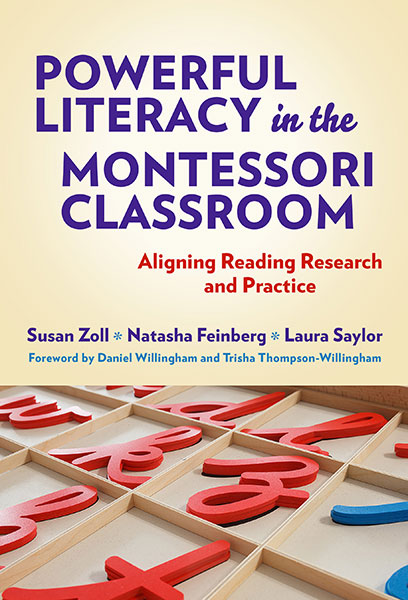Professors: Request an Exam Copy
Print copies available for US orders only. For orders outside the US, see our international distributors.
Susan Zoll, Natasha Feinberg, Laura Saylor
Foreword by: Daniel Willingham, Trisha Thompson-Willingham
Publication Date: January 27, 2023
Pages: 144

“This book is clearly written and well-supported by concrete examples of materials and implementation strategies that are directly aligned with current research findings. It is especially useful for teachers in Montessori settings. However, the ideas are universal and could easily find effective implementation in traditional classrooms...” —Teachers College Record
Teaching reading successfully requires deep knowledge of the reading process and development, as well as the implementation of impactful reading instruction and differentiation. This book aligns Montessori didactic materials and pedagogy, developed over a century ago, with current research on reading development.
Readers will gain a solid overview of the Montessori philosophy and method, specifically as related to reading and language development, enabling them to support their practice in today’s educational context while inspiring the wider field of education. The authors explain how the Montessori approach is inherently aligned with the Science of Reading in that they are both scientifically based and contain methods that follow a logical, systematic, and explicit progression of teaching and learning.
Montessori education supports instructional differentiation that is cognizant of children’s need for independence and highly mindful of literacy and language development. This book provides valuable contributions to all educators implementing Science of Reading and structured literacy in their practice, and is a must-have for Montessori teachers (preschool to grade 3) and those that prepare, coach, and supervise them.
Book Features:
Susan Zoll is an associate professor and co-coordinator of the early childhood education program at Rhode Island College. Natasha Feinberg is an assistant professor in the Elementary Education Department at Rhode Island College. Laura Saylor is dean of the School of Education at Mount St. Joseph University.
“This book is clearly written and well-supported by concrete examples of materials and implementation strategies that are directly aligned with current research findings. It is especially useful for teachers in Montessori settings. However, the ideas are universal and could easily find effective implementation in traditional classrooms should the appropriate materials be available.”
—Teachers College Record
“The authors take the reader on a journey through all aspects of reading—a depth most books cannot match—showing how each component is handled in a Montessori classroom, and how that pedagogy aligns with scientific findings. … Zoll, Feinberg, and Saylor have done a signal job of explaining complex sets of ideas with clarity and flair. Read, enjoy, and profit!”
—From the Foreword by Daniel T. Willingham, professor, University of Virginia, and Trisha Thompson-Willingham, Montessori consultant
“In Powerful Literacy in the Montessori Classroom, Zoll, Feinberg, and Saylor pay homage to Montessori education, the Science of Reading, and the uniqueness of every child in the classroom. Containing a rich exploration of topics including phonological awareness and verbal reasoning, this book is a must-read for teachers (Montessori and otherwise), educational policymakers, and all lifelong learners who value written and spoken language and discourse.”
—Munir Shivji, executive director, American Montessori Society
“The authors successfully break down and juxtapose the components of both the Science of Reading and Montessori language instruction, demonstrating how well aligned they are to one another, all in service of advancing children’s literacy. An excellent and timely resource for both Montessori and non-Montessori educators alike!”
—Wendy Shenk-Evans, executive director, Montessori Public Policy Initiative
“This book is a valuable resource for educators working to help all children successfully enter the world of reading. Too many children unnecessarily struggle with learning to read. By implementing the evidence-based instructional guidance provided in this book, educators can make a big difference in the lives of the children they teach.”
—Amy Murdoch, founding director, Center for Reading Science, Mount St. Joseph University
Contents
Foreword by Daniel T. Willingham and Trisha Thompson-Willingham ix
Welcome xi
Preface xiii
Acknowledgments xix
1. Montessori Education 1
Dr. Maria Montessori 1
Growth of Montessori Education 3
Montessori Materials and the Prepared Environment 5
The Montessori Educator’s Approach to Instruction 10
2. Science of Reading Overview 17
Structured Literacy 18
Seminal Research 18
Simple View of Reading 20
Hollis Scarborough’s Reading Rope 21
Considering the Montessori Curriculum and Alignment to Science of Reading (SoR) Literature 23
Part I: Word Recognition
3. Phonological Awareness 29
Science of Reading—Phonological Awareness 29
Phonological Awareness in the Montessori Classroom 31
Exemplar Structured Literacy Activities: Phonological Awareness 34
4. Decoding 37
Science of Reading—Decoding 37
Decoding in the Montessori Classroom 41
Exemplar Structured Literacy Activities: Decoding 48
5. Sight Recognition 51
Science of Reading—Sight Recognition 51
Sight Recognition in the Montessori Classroom 52
Exemplar Structured Literacy Activities: Sight Recognition 54
Part I Conclusion 56
Part II: Language Comprehension
6. Background Knowledge 61
Science of Reading—Background Knowledge 62
Background Knowledge in the Montessori Classroom 63
Exemplar Structured Literacy Activities: Background Knowledge 66
7. Vocabulary 70
Science of Reading—Vocabulary 70
Vocabulary in a Montessori Classroom 72
Exemplar Structured Literacy Activities: Vocabulary 75
8. Language Structures 79
Science of Reading—Language Structures 79
Language Structures in a Montessori Classroom 80
Exemplar Structured Literacy Activities: Language Structures 86
9. Verbal Reasoning 90
Science of Reading—Verbal Reasoning 90
Verbal Reasoning in a Montessori Classroom 91
Exemplar Structured Literacy Activities: Verbal Reasoning 92
10. Literacy Knowledge 99
Science of Reading—Literacy Knowledge 99
Literacy Knowledge in a Montessori Classroom 100
Exemplar Structured Literacy Activities: Literacy Knowledge 102
Part II Conclusion 106
11. Conclusion 107
Scientific Thinking, Discourse, and Advocacy to Improve the Lives of Children 107
References 109
Index 117
About the Authors 123
Professors: Request an Exam Copy
Print copies available for US orders only. For orders outside the US, see our international distributors.